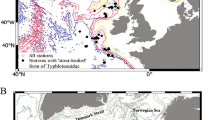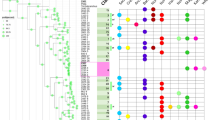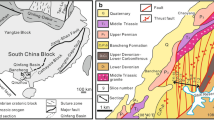Abstract
THE genus Rathkea, one of the Anthomedusæ, is represented on the Atlantic coast of North America by three species: (1) the widely distributed blumenbachii, (2) the northern octopunctata, and (3) the southern elegans. The species octopunctata is widely distributed in the North Atlantic1, being found off the coasts of Norway, Barents Sea, Heligoland, the British Isles and New England. Fewkes2 noted the presence of octopunctata in Narragansett Bay and stated that it is common off the New England coast in March. A well-marked variety of octopunctata, namely, grata, A. Agassiz, is confined to the Atlantic coast of North America, where, according to Mayer1, it is common north of New Jersey.
This is a preview of subscription content, access via your institution
Access options
Subscribe to this journal
Receive 51 print issues and online access
$199.00 per year
only $3.90 per issue
Buy this article
- Purchase on Springer Link
- Instant access to full article PDF
Prices may be subject to local taxes which are calculated during checkout
Similar content being viewed by others
References
Mayer, A. G., "Medusae of the World", Vol. 1, Carnegie Institution of Washington, Washington, D.C. (1910).
Fewkes, J., Bull. Mus. Comp. Zool., Harvard College, 8, 142, plate 1, Figs. 1–7 (1881).
Author information
Authors and Affiliations
Rights and permissions
About this article
Cite this article
LITTLEFORD, R. Distribution of Rathkea. Nature 143, 1070–1071 (1939). https://doi.org/10.1038/1431070a0
Issue Date:
DOI: https://doi.org/10.1038/1431070a0
This article is cited by
-
A review of cnidarians and ctenophores feeding on competitors in the plankton
Hydrobiologia (1991)
Comments
By submitting a comment you agree to abide by our Terms and Community Guidelines. If you find something abusive or that does not comply with our terms or guidelines please flag it as inappropriate.



